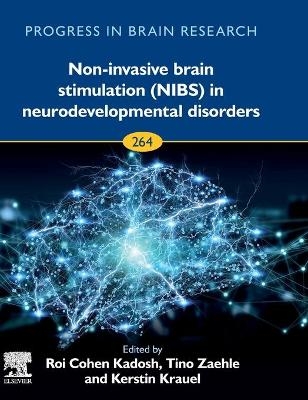
Non-invasive Brain Stimulation (NIBS) in Neurodevelopmental Disorders
Elsevier Science Publishing Co Inc (Verlag)
978-0-12-822344-4 (ISBN)
Roi Cohen Kadosh is a Professor of Cognitive Neuroscience at the University of Oxford. He received his PhD in Neuropsychology (summa cum laude, direct track) on the mental operations and neuropsychological mechanisms of numerical and magnitude processing under the supervision of Avishai Henik from the Ben-Gurion University in 2006. During this time he also had the opportunity to gain experience with neuroimaging techniques, such as fMRI and ERP under the supervision of David Linden at the Max Planck Institute for Brain Research (Frankfurt, Germany), and practiced for one year as clinical neuropsychologist at the Traumatic Brain Injuries Unit, Beit Lowenstein Rehabilitation Center in Israel. During his PhD period he also completed the European Diploma in Cognitive and Brain Sciences (EDCBS, 2003-4). He received funding from several sources including the International Brain Research Organization, and the European Union (Marie Curie Intra European Fellowship) to investigate the neural substrate of numerical representations using brain stimulation and neuroimaging during his postdoctoral training with Vincent Walsh at University College London. He joined EP as a Wellcome RCD Fellow in 2009 where he established the Cohen Kadosh Lab. Tino Zaehle is a research group leader of the Division of Neuropsychology at the Department of Neurology at the Otto-von-Guericke University of Magdeburg, Germany. His research focuses on the neurophysiological underpinnings as well as potential clinical applications of neuromodulation methods. He is specifically interested in the direct behavioral and electrophysiological impact of non-invasive brain stimulation as well as in the neuropsychological consequences of deep brain stimulation in neuropsychiatric patients. For this purpose, he uses and advances multimodal imaging techniques. In his work, Dr. Zaehle collaborates with several universities in the EU and US and researchers from all over the world. Kerstin Krauel is an assistant professor at the Department of Child and Adolescent Psychiatry and Psychotherapy at the Otto-von-Guericke University of Magdeburg, Germany and a licensed child and adolescent psychotherapist. In her research, she focuses on how attentional and memory processes are altered in children and adolescents with attention deficit hyperactivity disorder (ADHD) and aims to identify beneficial learning conditions for this patient group. Within the last years, she established transcranial electrical stimulation (TES) in her group to explore this treatment approach in ADHD and other neurodevelopmental disorders. Prof Krauel is currently coordinating investigator in a multi-center clinical trial using optimized multi-channel transcranial direct current stimulation in children and adolescents with ADHD funded by the European Union.
1. Cortical current density magnitudes during transcranial direct current stimulation correlate with skull thickness in children, adolescent and young adults Alexander Hunold 2. Potential targets for the treatment of ADHD using transcranial alternating current simulation Christoph S. Herrmann 3. Neuroplasticity and non-invasive brain stimulation in the developing brain Igor D. Bandeira 4. Effects of transcranial stimulation in developmental neurocognitive disorders: A critical appraisal Flavia H. Santos, Jochen A. Mosbacher, Deny Menghini, Katya Rubia, Roland H. Grabner and Roi Cohen Kadosh 5. Transcranial direct current stimulation in ADHD: A meta-analysis of clinical efficacy outcomes Alexander Prehn-Kristensen, Carolin Breitling-Ziegler and Vera Moliadze 6. Five-day application of HD-tDCS to the right IFG in children and adolescents with ADHD Carolin Breitling-Ziegler 7. Effects of a short, intensive, multi-session tDCS treatment in developmental dyslexia: preliminary results of a sham-controlled randomized clinical trial Deny Menghini and Stefano Vicari 8. Dysfunctional auditory gamma oscillations in developmental dyslexia: A potential target for a tACS-based intervention Katharina S. Rufener and Tino Zaehle 9. Effects of anodal high-definition transcranial direct current stimulation (HD-tDCS) on social-cognitive performance in healthy subjects: A randomized sham-controlled crossover pilot study Helena Catarina Pereira and Miguel Castelo-Branco 10. Brain stimulation by tDCS as treatment option in Autism-Spectrum-Disorder: A systematic literature review and critical discussion Christina Luckhardt 11. Impact of chronic tRNS on prefrontal cortex excitation-inhibition balance in young mice Javier Marquez Ruiz 12. NIBS to rehabilitate neurodevelopmental disorders: A study on professionals’ beliefs Alessandro Antonietti 13. Transcranial direct-current stimulation and pediatric attention deficit hyperactivity disorder (ADHD) – findings from an interview ethics study with children, adolescents, and their parents Anna Karolina Sierawska, Kerstin Krauel and Michael Siniatchkin 14. From Adults to Pediatrics: A Review of Noninvasive Brain Stimulation (NIBS) to Facilitate Recovery from Brain Injury Badran W. Bashar, Patty C. Coker-Bolt, Mark George, Marom Bikson and Bernadette Gillick 15. Transcutaneous vagus nerve stimulation in patients with attention-deficit hyperactivity disorder: Current Evidence and Opinion Tino Zaehle
| Erscheinungsdatum | 28.06.2021 |
|---|---|
| Reihe/Serie | Progress in Brain Research |
| Sprache | englisch |
| Maße | 191 x 235 mm |
| Gewicht | 1000 g |
| Themenwelt | Geisteswissenschaften ► Psychologie ► Biopsychologie / Neurowissenschaften |
| Naturwissenschaften ► Biologie ► Humanbiologie | |
| Naturwissenschaften ► Biologie ► Zoologie | |
| ISBN-10 | 0-12-822344-8 / 0128223448 |
| ISBN-13 | 978-0-12-822344-4 / 9780128223444 |
| Zustand | Neuware |
| Haben Sie eine Frage zum Produkt? |
aus dem Bereich


